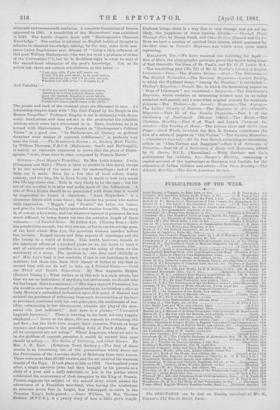NOVELS. — Aunt Ifopsy's Foundling. By Mrs. Leith Adams. 3 vole. (Chapman
and Hall.)—There is little to attract in this novel, except it be the novelty of the scene and the surroundings ; and of this little use is made. Save for a few bits of local colour, winter scenery, and the like, life in Nova Scotia is made to look very much like life anywhere else. This is very likely to be the case ; but the art of the novelist is to seize and make much of the differences. A tale of Nova Scotia should be so penetrated with these that it would be impossible to locate it elsewhere. "Aunt Hephzibah " is a character drawn with some force ; the heroine is a person who makes little impression. " Maggie" and " Frostie," the helps, are bettor, and give the idea of being fairly saccessful studies from life. The story is, of COOT so, a love-story, and has whatever interest it possesses far too much diffused, by being drawn out into the orthodox length of three voluines.—A Twisted Skein. By Esther Ayr. (Tinsley Bros.)—Life has perplexities enough, but they are not, as far as our knowledge goes, of the kind which Miss Ayr, like novelists without number before her, invents. Forged letters and false reports of marriages and the like belong to a world of fiction. This world, however, thanks to the laborious efforts of a hundred years or so, has come to have a sort of existence which justifies in a way the using of them as the machinery of a story. The question is,—are they used skilfully or no P Miss Ayr's book is just readable, if one is not fastidious in such matters; but those who limit their library of fiction to the best or second best, will not do well to take up A Twisted Skein.—Until the nu,/ and Fourth. Generation. By Mrs. Augustus Bright. (Samuel Tinsley.)—What strikes us in this tale is a style which, but that we see no indications of anything but seriousness, we should take for burlesque. Here is a sentence :—" She was a staunch Protestant, but she would as soon have dreamed of questioning an Archbishop's edict as Lady Mervyn's undoubted inclination upon this point if Samuel had evinced the prudence of refraining from such denunciation of his tares as provoked, combined with her own grievance, the sentiments of hos- tility, culminating in the dhouement, wherein she played the spon- sorial role just indicated." And here is a phrase,—" Unwonted hygienic buoyancy," There is learning in the hook, not very happily employed :—" Down on the shore, the sea repeats its everlasting ebb and flow ; bat the birds have sought their crannies, Nature at largo reposes, and Angorona is the presiding deity of Finch Abbey. But all its occupants are not asleep." Where Angerona, whom we take to be the goddess of anguish, presides, it would be natural that none should be asleep.---The Exiles of Saltzbiirg, and Other Stories. By Mrs. J. H. Kerr. (Religions Tract Society.)—The first of these stories is an interesting tale of the persecutions which drove out the Protestants of the Austrian duchy of Saltzburg from their homes. There were more than 20,000 victims, and the net received the warmest thanks of the Popo. It took place as late as 1732. One hundred years after, a single survivor (who had been brought by his parents as a child of a year and a half) remained, to join in the jubilee which celebrated tho anniversary of their reception by the King of Prussia. Prussia suggests the subject of the second story, which relates the adventures of a Frankfort merchant, who, having the misfortune to measure seven feet in height, was kidnapped, to serve in the Prussian King's body-guard.—Sweet William, by Mrs. Thomas Erskine (S.P.C.K.), is a pretty story of how a little girl's simple kindness brings about in a way that is very strange, and yet not un- likely, the happiness of some humble friends.—Through Flood, Through Fire, by Henry Forth, and Other Stories, (Cassell and Co.)— Here we have a number of spirited little stories, which appeared for the first time in Cassell's Magazine, and which were quite worth reprinting.


































 Previous page
Previous page